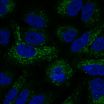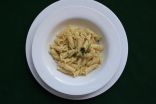Cancer drug makes fruit flies live longer
2015-06-25
(Press-News.org) Adult fruit flies given a cancer drug live 12% longer than average, according to a UCL-led study researching healthy ageing. The drug targets a specific cellular process that occurs in animals, including humans, delaying the onset of age-related deaths by slowing the ageing process.
The study published today in Cell and funded by the Max Planck Society and Wellcome Trust shows for the first time that a small molecule drug, which limits the effects of a protein called Ras, can delay the ageing process in animals. The treated fruit flies outlived the control group by staying healthier for longer.
Co-first author, Dr Nazif Alic, UCL Institute of Healthy Ageing, said: "Our aim is to understand the mechanisms of ageing and alter the processes that lead to loss of function and to disease. We studied this molecular pathway in flies because they are reasonably complex and yet age more quickly than mammals. We were able to extend their lifespan both genetically and by using a cancer drug to target the Ras pathway, which provides us with the first evidence for the anti-ageing potential of drugs developed to dampen this pathway."
Trametinib is used to treat skin cancer and was chosen for its ability to inhibit Ras signalling as part of the 'Ras-Erk-ETS' cell pathway. The role of Ras has been well characterised in cancer but it is also known to affect the ageing process. Previously, the DNA of yeast was changed to reduce Ras activity, which extended lifespan, so the team wanted to explore inhibitors of this pathway in an animal.
Female fruit flies were given trametinib as an additive in their food. A small dose of 1.56 µM, which is approximately equivalent to a daily dose of the drug in a human cancer patients, increased the fruit flies' average life expectancy by 8%. With a higher dose of 15.6 µM, the flies lived 12% longer on average.
To test the anti-ageing properties of the drug in later life, fruit flies over 30 days old that had almost all stopped laying eggs were given the same moderate dose of 15.6 µM, and still had an increased life expectancy of 4%. Flies exposed continuously to the drug from an earlier stage in life lived longer than those who began dosing later in life, possibly indicating a cumulative effect of the drug.
Co-first author, Dr Cathy Slack, UCL Institute of Healthy Ageing, said: "Identifying the importance of the Ras-Erk-ETS pathway in animal ageing is a significant step on the way to developing treatments that delay the onset of ageing. The pathway is the same in humans as it is in flies and, because the Ras protein plays a key role in cancer, many small molecule drugs already exist, some of which have been approved for clinical use. With support from pharma, we can refine these molecules over the next 10-20 years to develop anti-ageing treatments which don't have the adverse effects of cancer drugs."
Principal Investigator, Professor Dame Linda Partridge, Director of the UCL Institute of Healthy Ageing and the Max Planck Institute for Biology of Ageing, said: "My groups study the changes in diet and genetic make-up that can slow down ageing, with the aim of identifying drug targets for a broad-spectrum, preventative medicine for the diseases of human ageing. Death still seems to be inevitable, but we now have evidence to suggest it is possible to develop pharmacological treatments to keep us healthier for longer. Our next step is to investigate the effects of targeting the Erk-Ras-ETS pathway in more complex animals, such as mice, with a view to developing a drug regime that could be suitable for testing in humans. This project complements other work we are doing into the ways in which the ageing process acts as a risk factor for neurodegenerative disease."
INFORMATION:
ELSE PRESS RELEASES FROM THIS DATE:
2015-06-25
Boston, MA -- A new study led by researchers at Harvard T.H. Chan School of Public Health finds that a malaria parasite protein called calcineurin is essential for parasite invasion into red blood cells. Human calcineurin is already a proven target for drugs treating other illnesses including adult rheumatoid arthritis and lupus, and the new findings suggest that parasite calcineurin should be a focus for the development of new antimalarial drugs.
"Our study has great biological and medical significance, particularly in light of the huge disease burden of malaria," said ...
2015-06-25
LA JOLLA--As a tumor grows, its cancerous cells ramp up an energy-harvesting process to support its hasty development. This process, called autophagy, is normally used by a cell to recycle damaged organelles and proteins, but is also co-opted by cancer cells to meet their increased energy and metabolic demands.
Salk Institute and Sanford Burnham Prebys Medical Discovery Institute (SBP) scientists have developed a drug that prevents this process from starting in cancer cells. Published June 25, 2015 in Molecular Cell, the new study identifies a small molecule drug that ...
2015-06-25
Washington, DC (June 25, 2015) - Comment sections on websites continue to be an environment for trolls to spew racist opinions. The impact of these hateful words shouldn't have an impact on how one views the news or others, but that may not be the case. A recent study published in the journal Human Communication Research, by researchers at the University of Canterbury, New Zealand, found exposure to prejudiced online comments can increase people's own prejudice, and increase the likelihood that they leave prejudiced comments themselves.
Mark Hsueh, Kumar Yogeeswaran, ...
2015-06-25
June 25 -- During the wars in Iraq and Afghanistan, U.S. combat support hospitals treated at least 650 children with severe, combat-related head injuries, according to a special article in the July issue of Neurosurgery, official journal of the Congress of Neurological Surgeons. The journal is published by Wolters Kluwer.
"Given the challenging environment and limited available resources, coalition forces were able to provide quality, timely, and life-saving care to many children" with severe head injuries, write Dr. Paul Klimo, Jr., of Semmes-Murphy Neurologic & Spine ...
2015-06-25
A large number of patients use online communication tools such as email and Facebook to engage with their physicians, despite recommendations from some hospitals and professional organizations that clinicians limit email contact with patients and avoid "friending" patients on social media, new research suggests.
The findings from Johns Hopkins Bloomberg School of Public Health researchers suggest a disconnect between what patients expect and what physicians -- concerned about confidentiality and being overwhelmed in off-hours -- are willing to do when it comes to online ...
2015-06-25
June 25, 2015 - New results in animals highlight a major safety concern regarding a class of magnetic resonance imaging (MRI) contrast agents used in millions of patients each year, according to a paper published online by the journal Investigative Radiology. The journal is published by Wolters Kluwer.
The study adds to concerns that repeated use of specific "linear"-type gadolinium-based contrast agents (GBCAs) lead to deposits of the heavy-metal element gadolinium in the brain. The results will have a major impact on the multimillion-dollar market for MRI contrast agents, ...
2015-06-25
Many patients in the latter stage of Parkinson's disease are at high risk of dangerous, sometimes fatal, falls. One major reason is the disabling symptom referred to as Freezing of Gait (FoG) -- brief episodes of an inability to step forward that typically occurs during gait initiation or when turning while walking. Patients who experience FoG often lose their independence, which has a direct effect on their already degenerating quality of life. In the absence of effective pharmacological therapies for FoG, technology-based solutions to alleviate the symptom and prolong ...
2015-06-25
While the use of antiangiogenesis drugs that block the growth of new blood vessels can improve the treatment of some cancers, clinical trials of their ability to prevent the development of new metastases have failed. Now a study from the Massachusetts General Hospital (MGH) Cancer Center may have found at least one reason why. In their paper published online in the Journal of the National Cancer Institute, an MGH research team reports finding that the growth of metastases in lymph nodes -- the most common site of cancer spread -- does not require new blood vessels but instead ...
2015-06-25
A good or mediocre appetizer has the potential to significantly change how the main course is enjoyed, according to one Drexel food science professor.
Jacob Lahne, PhD, an assistant professor in the Center for Hospitality and Sport Management, recently found that a comparatively good appetizer could make people enjoy the main course less than if it were preceded by a mediocre appetizer.
Lahne tested and analyzed subjects' hedonic (liking) responses to a main dish of "pasta aglio e olio" (pasta with garlic and oil) after they had either a good or mediocre bruschetta ...
2015-06-25
Nature loves crystals. Salt, snowflakes and quartz are three examples of crystals - materials characterized by the lattice-like arrangement of their atoms and molecules.
Industry loves crystals, too. Electronics are based on a special family of crystals known as semiconductors, most famously silicon.
To make semiconductors useful, engineers must tweak their crystalline lattice in subtle ways to start and stop the flow of electrons.
Semiconductor engineers must know precisely how much energy it takes to move electrons in a crystal lattice. This energy measure is the ...
LAST 30 PRESS RELEASES:
[Press-News.org] Cancer drug makes fruit flies live longer

